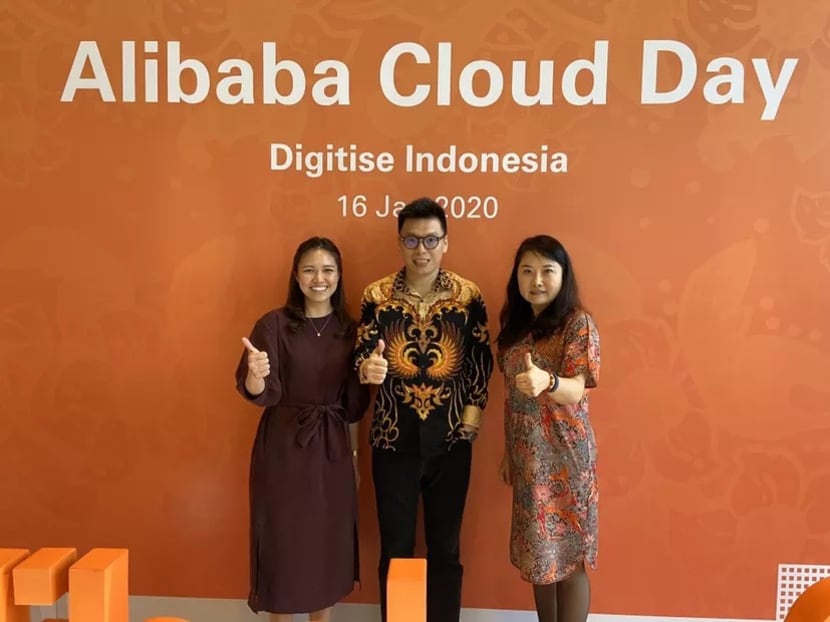Gen Y Speaks: I had doubts when an Alibaba firm wanted to hire me. But I’m glad I gave it a shot
I had always been interested in business and finance. I studied business administration at Singapore Management University and had completed two internship stints at a major international bank.

Deciding whether to join Alibaba Cloud "was probably the hardest decision of my life up until then", says the author.
I had always been interested in business and finance. I studied business administration at Singapore Management University and had completed two internship stints at a major international bank.
But just before I graduated and joined the finance world full-time, I got a job offer from a major Western tech multinational corporation.
Joining the tech industry was something I had never considered before, as I had zero interest or knowledge about coding, programming and so on.
But for the first time, I acted on a long running impulse to take full control of my own life instead of following the natural “path” that my journey had been leading me to.
So while my peers joined the organisations they were already eyeing at the start of their degree programme, I took the plunge to join a completely new sector.
It was extremely daunting. I was completely clueless about tech. I didn’t know all the jargon that was frequently thrown around in the room, or much about programming, software or IT in general.
Even though my initial roles at the company were in business development and marketing — two areas I should be comfortable with given my degree major – it was hard promoting products convincingly when I didn’t understand them enough to do so.
The benefit was that in large and established companies like the one I was at, there was usually an answer already available somewhere.
I still remember the words of my mentors and colleagues when I was struggling with something: “Don’t spend more than five minutes on a problem, because someone has already done it. Just ask around.”
This advice was spot on. I quickly familiarised myself with the ins and outs of enterprise tech, sought help when I needed to, and settled in.
But I felt a familiar itch again four years in. The technology industry is faster paced than most, and I felt the need to grow further and faster, through new challenges if need be.
I came across an opening for the global partnership team in Alibaba Cloud, the enterprise technology arm of the major Chinese multinational corporation of Alibaba Group.
After reviewing the job description, I felt I had the necessary skills and experience, and so I applied.
But during the interview, I found out that the role was quite different from what I thought.
What they were looking for was someone who could set up a global partner alliance from scratch, as part of a small team.
To Alibaba Cloud, my experience with marketing and business development for enterprise tech means I should be able to connect and work with external parties.
But after the interview, I had my doubts. I had less than five years of full-time working experience so far — and now I am joining this global team, and helping it build things from scratch?
Also, like most Singaporeans my age, my English is a lot better than my Mandarin, and I was worried that I would not be able to communicate effectively with other team members.
But a thought kept gnawing at me.
After working in the Western enterprise tech company, I finally understood how small Singapore is. To become a truly global employee and to maximise my own career, I needed to travel more, learn more and work in other cultures more.
It was probably the hardest decision of my life up until then — continue on this path that I was already comfortable with, or go even further off the beaten path by joining a Chinese multinational company.
Today, one-and-a-half years after taking up the challenge from Alibaba Cloud, I have no regrets.
I don’t think there are many companies out there that would be willing to give a relatively inexperienced 20-something a shot at managing a global partnership programme, much less set it up from scratch.
I love the sense of achievement and meaning in the work I’m doing and that drives me to continue giving my best each day. Being able to travel (pre-pandemic of course) is definitely another boon.
If you are looking to join a Chinese multinational, now that there are several of them in Singapore, here are some of my experiences that I hope you find useful.
At Alibaba Cloud, it is still very much a start-up culture despite the company’s size. This translates into a bias for action and owning the work you are doing completely and putting in your all to ensure your “baby” is well looked after.

This may mean working beyond regular hours at times to care for the project you created and are responsible for, because that project represents and reflects yourself, ultimately.
It also means a lot of exposure and interactions with senior figures in the organisation who founded or played a key part in growing the company, which truly inspires me.
For example, every new employee gets to visit the Alibaba campus in China for an orientation (in pre-pandemic times) and, very often, also gets to meet at least a member of the founding team.
There is a high tolerance for mistakes. No one dwells on them, much less your boss. What matters to everyone is your tenacity — are you able to shrug it off, learn from it, and try the next idea you have?
There are usually no answers. More often than not, you have to create the solution yourself. I like to joke that my role wasn’t just starting with a blank slate, but to even create the slate itself in the first place.
Previously, I did not spend more than five minutes on a problem because I knew an answer was available somewhere. Today, I can spend more than an hour working on a problem and trying to find a solution because no one has done it before. It imbues a huge sense of ownership.
My concern about whether I can communicate effectively in Chinese was a moot point.
It is worth bearing in mind that like any multinational corporation, the day-to-day language used in the Singapore office is English.
In fact, some of my expatriate colleagues are adept with Singlish after working closely with local customers.
Working for Alibaba is also an interesting cultural experience in itself. While it is optional, almost everyone has a nickname they prefer to go by when interacting with colleagues.
Many colleagues opt for names from martial arts novels.
But there are some even more interesting nicknames that reflect the personality and passion of the employee — for example, there is someone who goes by “cabbage” because of her love for the vegetable.
The tech industry is still growing exponentially, and it doesn’t just need coders, programmers and IT-centric people.
I don’t believe people should turn their noses up at certain companies without experiencing it for themselves.
I still don’t know where my new path will lead me to. But I’m excited to continue pushing onward until new emerging skills are needed in the industry.
ABOUT THE AUTHOR:
Monica Chan, 30, is a senior business development specialist for alliances at Alibaba Cloud.






